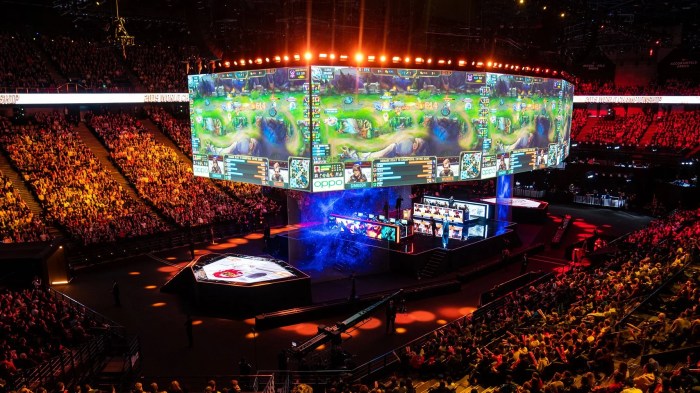League of Legends tournaments broadcast deal 300 million—that’s not a typo. This massive investment shakes up the esports world, promising a tidal wave of change for players, teams, and viewers alike. We’re diving deep into the financial implications, the impact on viewership, and the strategic maneuvers behind this record-breaking deal. Get ready for a rollercoaster ride through the numbers, the strategies, and the future of competitive League of Legends.
From potential ROI for broadcasters to the ripple effects on player salaries and team sponsorships, this deal is a game-changer. We’ll analyze the broadcasting strategies, compare it to similar deals in other esports, and even speculate on how this might reshape the competitive landscape. Buckle up, because this is one wild ride.
Competition and Market Landscape: League Of Legends Tournaments Broadcast Deal 300 Million
The $300 million League of Legends broadcasting deal represents a significant milestone in esports, but its impact needs to be understood within the broader competitive landscape. This deal dwarfs many others, raising questions about market valuation, competitive strategies, and the future of esports broadcasting. Analyzing similar deals and the competitive dynamics is crucial to fully grasp its implications.
The $300 million deal significantly surpasses many other esports broadcasting contracts. While precise figures for many deals remain undisclosed, publicly available information suggests that this deal is amongst the highest, if not the highest, ever secured for a single esports title’s broadcasting rights. For example, while some major tournaments in titles like Dota 2 or Counter-Strike: Global Offensive have attracted substantial investment, none have publicly reached this scale. This highlights the immense commercial value of League of Legends and its global audience.
Comparison with Similar Esports Deals
Several factors contribute to the disparity between the League of Legends deal and others. The size and global reach of League of Legends’ player base and viewership are paramount. The consistent popularity and long-standing competitive scene also contribute to its high value. Furthermore, Riot Games, the developer of League of Legends, has a proven track record of successfully cultivating its esports ecosystem, which makes it an attractive partner for broadcasters. This contrasts with some other esports titles which might have a more fragmented or less established professional scene.
Key Competitors in the Esports Broadcasting Market, League of legends tournaments broadcast deal 300 million
The esports broadcasting market is a fiercely competitive landscape. Key players include established streaming platforms like Twitch and YouTube Gaming, which dominate the live streaming market. Other significant players are dedicated esports platforms such as ESPN+, which focus on broadcasting major esports events and creating dedicated esports content. Traditional sports broadcasters, such as ESPN and others, are also increasingly investing in esports broadcasting rights, recognizing its growing audience and commercial potential. Finally, individual esports organizations are also developing their own streaming capabilities, aiming to build direct relationships with their fan bases.
Long-Term Implications of the Deal on the Competitive Landscape
This massive deal will likely trigger a ripple effect across the esports broadcasting market. Other esports titles and organizations may seek to negotiate similar, though possibly smaller, deals. This could lead to increased competition for broadcasting rights and potentially drive up the value of esports content. It also highlights the increasing professionalization and commercial viability of esports as a whole. However, it could also exacerbate existing inequalities between established titles like League of Legends and smaller, emerging esports scenes.
Strategies Employed by Other Esports Organizations
Esports organizations employ various strategies to secure lucrative broadcasting contracts. These include fostering strong community engagement, creating high-quality and engaging content, and building a strong professional league structure. Successful organizations also focus on data-driven decision making, leveraging analytics to understand audience preferences and optimize their content strategy. Furthermore, securing sponsorships and partnerships is crucial in demonstrating the commercial viability of an esports title to potential broadcasters.
The market share of esports broadcasting platforms is constantly evolving. Precise figures are difficult to obtain due to the fragmented nature of the market and the lack of publicly available data from all platforms. However, a general overview can be provided based on observable trends and reported data.
| Platform | Market Share (Estimate) | Revenue (Estimate) | Key Features |
|---|---|---|---|
| Twitch | 40-50% | Billions (USD) | Large user base, robust streaming infrastructure, extensive community features |
| YouTube Gaming | 20-30% | Hundreds of millions (USD) | Integration with YouTube’s massive video platform, strong creator tools |
| Facebook Gaming | 10-15% | Tens of millions (USD) | Integration with Facebook’s social network, focus on community building |
| Other Platforms (ESPN+, dedicated esports platforms etc.) | 15-20% | Variable | Niche focus, dedicated esports content, strong partnerships with leagues and teams |
*Note: Market share and revenue figures are estimates and may vary based on different reporting methodologies and data sources.*
The $300 million League of Legends broadcast deal isn’t just about the money; it’s a bold statement about the future of esports. This deal signifies the growing maturity and profitability of the industry, attracting major investors and pushing the boundaries of what’s possible. The impact will be felt across the board, from increased viewership and player salaries to innovative broadcasting strategies and a more competitive market. It’s a new era, and the game has officially changed.
That $300 million League of Legends broadcast deal? Seriously impressive, right? It got me thinking about equally unexpected revenue streams, like the surprisingly lucrative niche of, say, a project fi vending machine airport operation. Imagine the potential! Back to the LoL deal though, that kind of cash is game-changing for esports.
 Insurfin Berita Teknologi Terbaru
Insurfin Berita Teknologi Terbaru
